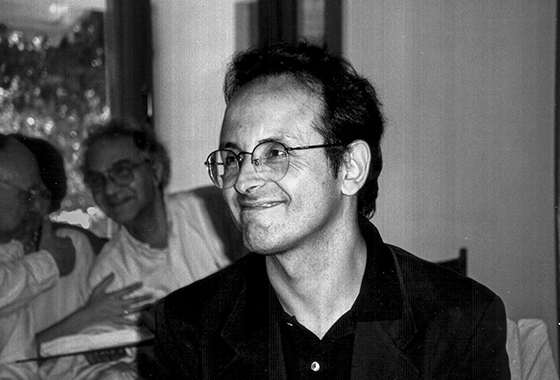Clarke and Clough on Varela,
an Interview with Lombardi
May 16, 2021, 9:00 PT, 12:00 ET, 18:00 CET
ASC Speaker series: Cybernetics and humans’ knowing
Recording
Abstract
Self-Organization, Self-Reference and Big Data
Chilean-born Francisco Varela (1946 – 2001) is particularly known for his work with Humberto Maturana on the concepts of autopoiesis, cognition, and observing. Varela is also known for extending the logic of Spencer-Brown’s Laws of Form with a calculus for self-reference.
During this interview with Bruce Clarke and Patricia Clough it is my hope to explore memories, interpretations and notions I now associate with the works of Francisco.
There is so much to explore, such as the interrelationship between organizational closure and information, the circularity of perturbations, and the nature of time. Is there a distinction between self-reference and self-referential systems? How does this relate to phenomenology?
Finally, I hope we all can explore the possible consequences of BIG DATA. Its constraints and possibilities in relation to our living as human beings on a self-organizing earth.
Articles
Francisco Varela, Relational Psychoanalysis, and the Post-Phenomenological by Patricia Ticineto Clough, 2017
On Observing Natural Systems, Francisco Varela in conversation with Donna Johnson, CoEvolution Quarterly, 1976
Participant’s Bio
Bruce Clarke is Paul Whitfield Horn Distinguished Professor of Literature and Science in the Department of English at Texas Tech University, and the 2019 Blumberg/NASA Chair in Astrobiology at the Library of Congress. His research focuses on systems theory, narrative theory, and ecology. Clarke co-edits the book series Meaning Systems, published by Fordham University Press. Clarke’s most recent book is Gaian Systems: Lynn Margulis, Neocybernetics, and the End of the Anthropocene (Minnesota, 2020). A recent post is on Francisco Varela in the systems counterculture (slides).
Patricia Ticineto Clough is a professor emerita of sociology and women studies at CUNY. She is the author of a number of publication, among them, Autoaffection: Unconscious Thought in the Age of Teletechnology, Feminist Thought, and most recently The User Unconscious: Affect, Media and Measure. She is editor of The Affective Turn; Theorizing the Social, co-editor of Beyond Biopolitics Essays in the Government of Life and Death, and co-editor of Intimacies, A New World of Relational Life. She is a practicing psychoanalyst in New York City where she also teaches and is a member of the Training Committee at the Institute for Contemporary Psychotherapy.
Judith (Jude) Lombardi is a social worker turned sociology professor turned video-ethnographer and “social” documentarian. In early 1990s her deep journey into cybernetic thinking occurred while working on a PhD in Human Relations and Cybernetics. In 1992, with a video camera in hand, she attended her first ASC conference. During the past 29 years jude has recorded and edited a variety of ASC events into movies which she often shows at ASC conferences. In 2014 she was commissioned by the ASC to create the movie “Living in Cybernetics, Celebrating 50 years of the ASC.” Dr. Lombardi taught sociology at a university in Baltimore, Maryland and retired in 2011. From 2012 – 2014 she worked on a documentary movie, “The Gentrification (k)NOT Movie,” which she presents in various settings to provoke conversations about gentrification and how we might prevent it from happening during the revitalization of a neighborhood. She is currently working on a movie about the cybernetics of Annetta Pedretti, “turning objects into rhythms” and part iii of her trilogy about Ernst von Glasersfeld, his life, and his work. Jude is also a bee steward in Baltimore Maryland.Photograph by Joan Halifax in Dharamsala, 1994





